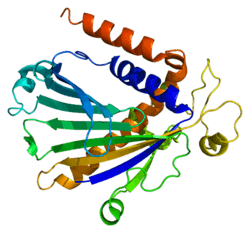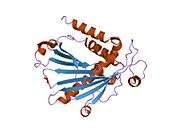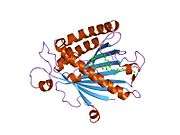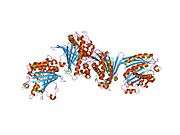Phosphatidylinositol transfer protein, alpha
Phosphatidylinositol transfer protein alpha isoform is a protein that in humans is encoded by the PITPNA gene.[5]
Phosphatidylinositol transfer proteins are a diverse set of cytosolic phospholipid transfer proteins that are distinguished by their ability to transfer phospholipids between membranes in vitro (Wirtz, 1991).[6]
References
- GRCh38: Ensembl release 89: ENSG00000174238 - Ensembl, May 2017
- GRCm38: Ensembl release 89: ENSMUSG00000017781 - Ensembl, May 2017
- "Human PubMed Reference:". National Center for Biotechnology Information, U.S. National Library of Medicine.
- "Mouse PubMed Reference:". National Center for Biotechnology Information, U.S. National Library of Medicine.
- Hay JC, Martin TF (Jan 1994). "Phosphatidylinositol transfer protein required for ATP-dependent priming of Ca(2+)-activated secretion". Nature. 366 (6455): 572–5. doi:10.1038/366572a0. PMID 8255295.
- "Entrez Gene: PITPNA phosphatidylinositol transfer protein, alpha".
Further reading
- Wirtz KW (1991). "Phospholipid transfer proteins". Annu. Rev. Biochem. 60: 73–99. doi:10.1146/annurev.bi.60.070191.000445. PMID 1883207.
This article is issued from Wikipedia. The text is licensed under Creative Commons - Attribution - Sharealike. Additional terms may apply for the media files.










